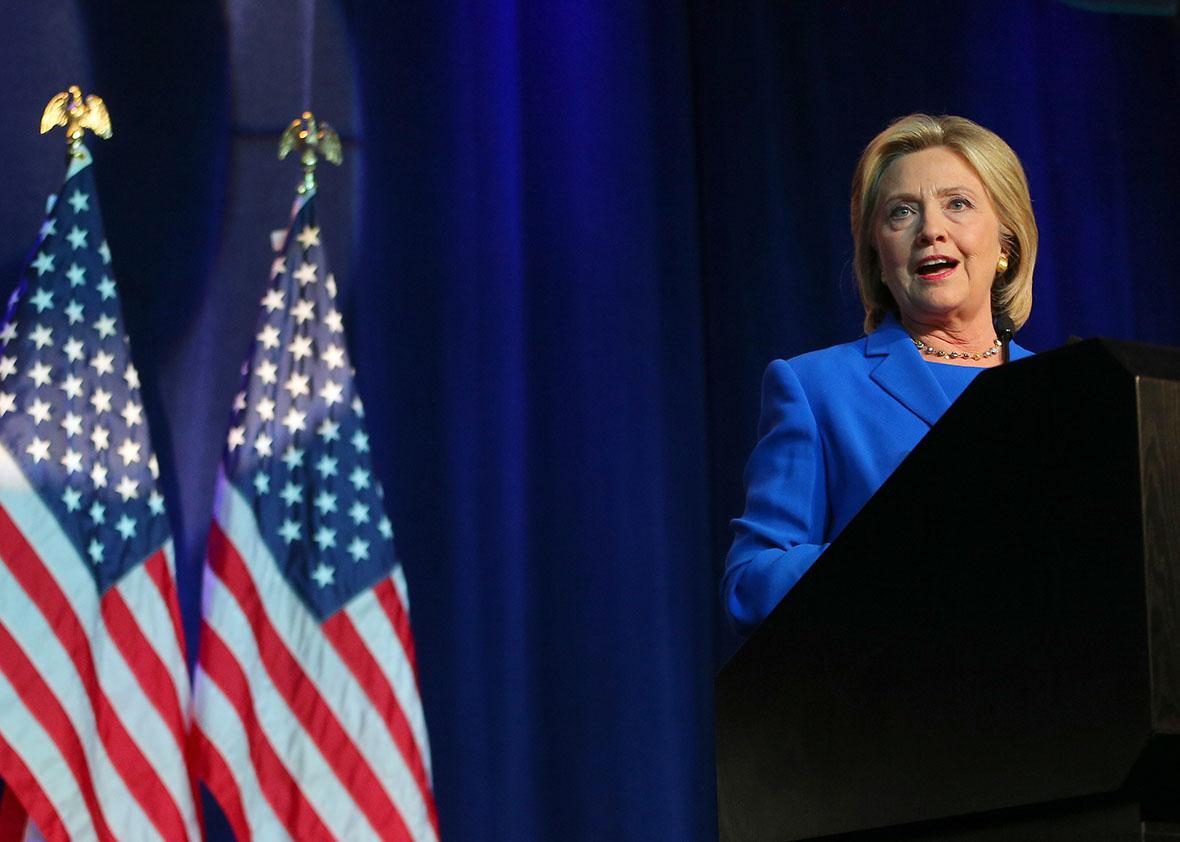Hillary Clinton owes a small thank-you to the Republican Party.
Her great challenge as a candidate—and nominee, should she win the Democratic primary—is to show continuity with the Obama administration without losing her distinctive voice. Even if she shares policies with the current president, her White House can’t be a third term for Barack Obama; the public wants a new vision. That’s especially true on foreign policy: Americans are consistently down on the administration’s approach to issues abroad—from ISIS to chaos in Syria—and support a more active strategy for facing foreign threats.
Polls bear this out. On average, since the beginning of last year, 50 percent of Americans have disagreed with Obama’s handling of foreign policy, while only 38 percent have approved of it. Fifty-four percent of Americans don’t think Obama is tough enough on foreign affairs and national security, and 48 percent say the United States is less important and powerful than it was a decade ago. On the Iran deal, 49 percent disapprove of the plan to monitor Iran’s nuclear facilities and lift international sanctions, while only 21 percent approve. Thirty percent don’t know enough to say either way.
Enter Republicans. Despite the advantage in public opinion, they’ve had a hard time offering a sharp foreign policy critique, in part because they refuse to budge from the worst ideas and strategies of the last GOP administration.
Iran is instructive. At every step of the argument over the nuclear agreement, Republicans have pushed maximum confrontation at the expense of diplomacy, rejecting the deal without offering an alternative. If elected president, for example, Florida Sen. Marco Rubio would renege on the deal and reimpose sanctions, as would Wisconsin Gov. Scott Walker. Arkansas Sen. Tom Cotton thinks we should reject the deal in favor of a “credible threat of military force,” and Illinois Sen. Mark Kirk compared the Iran deal to Nazi appeasement. “This is the greatest appeasement since Chamberlain gave Czechoslovakia to Hitler,” he said. The most flamboyant assault on the Iran deal came Wednesday, when Donald Trump and Sen. Ted Cruz gathered with hundreds of supporters to blast the administration. If the deal goes through, Cruz argued, Obama would “quite literally be the world’s largest financier of radical Islamic terrorism.”
Yes, the public wants a more active foreign policy. But it isn’t interested in reckless confrontation. People remember the last war, and aren’t thrilled with the chance for another one. To that point, 59 percent of Americans still think the Iraq war was a mistake, and 55 percent oppose putting ground troops back in the country. What’s more, about half of Americans are wary of too much foreign involvement. Put differently, the public wants an alternative, and it isn’t the GOP.
Which brings us back to Clinton. If Republicans represent the right wing of the mainstream debate on foreign policy, and if Obama represents the left, then Clinton is well-placed to stand in the center as a tough but diplomatic leader. And on Wednesday she staked that ground with a speech in support of the Iran deal. Speaking to a small audience at the Brookings Institution, Clinton—who helped pave the way for the initial negotiations—gave her vision for implementing the deal and containing Iran in the future. “We’ve got to start looking ahead to what comes next: enforcing it, deterring Iran and its proxies, and strengthening our allies,” she said. Clinton promised to continue and expand military aid to Israel; to build a “coalition to counter Iran’s proxies” like Hamas and Hezbollah; and to “not hesitate to take military action” if Iran pursues a nuclear weapon in violation of the deal. “We need to be clear-eyed about what we can expect from Iran,” she said. “This isn’t the start of some broader diplomatic opening. And we shouldn’t expect that this deal will lead to a broader change in their behavior.”
This is more hawkish than most rhetoric from President Obama and reflects her long comfort with using force, from voting for the war in Iraq to pushing action in Syria, which Obama ultimately rejected. In a Democratic primary, as Clinton learned in 2008, this is a liability. Vermont Sen. Bernie Sanders is running on left-wing economic policy, but there’s space to critique Clinton on foreign policy and win votes from the anti-war left.
With that said, Clinton’s approach may be the right tack for a general election. Again, voters want change. But they support diplomacy and don’t want another war or occupation. Clinton offers a third way: Obama-style policies merged with hawkish rhetoric. It satisfies the public but keeps Clinton to the left of the Republican Party, and clears her path for attacks on GOP candidates. Which, incidentally, is what she did. “That’s not leadership, that’s recklessness,” said Clinton of Republican rhetoric. “It would set us right down the very dangerous path we’ve worked so hard to avoid. … Great powers can’t just jump agreements and expect the rest of the world to go along with us.”
Hillary has a new attack line, and she owes it all to her (and Obama’s) opponents in the GOP.
